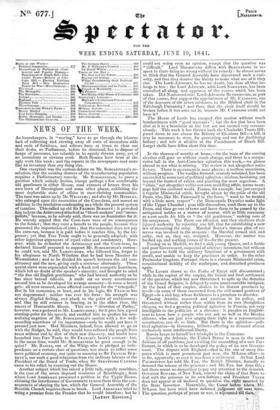NEWS OF THE WEEK.
As housekeepers, in "moving," have to go through the irksome task of collecting and stowing away all sorts of anomalous odds and ends of furniture, and editors have at times to clear out their desks, so Parliament, before its dismissal, has to dispose of heaps of measures, too valuable to be openly thrown away, yet of no immediate or obvious avail. Both Houses have been at the ugly work this week; and the reports in the newspapers read more like an inventory than any thing else.
One exception was the curious debate on Mr. SCHOLEFIELD'S re- solution, that the existing distress of the manufacturing population requires a Parliamentary remedy. Mr. SCHOLEFIELD, to prove a position which nobody doubts, except perhaps a few comfortable old gentlemen in either House, read extracts of letters from his own town of Birmingham and some other places, exhibiting the most deplorable state of affairs in once-thriving communities. - The tune was taken up by Mr. WILLIAMS ; and also by Mr. HINDLEY, • who enlarged upon the enormities of the Corn-laws, and moved an addition to'the resolution condemning as a whole the present system of taxation. This called up old Sir Faavas Stamm : it provoked . hina to heartheAristoeracy attacked as "blood-suckers" and "mono- polists," because, as he naively said, there was no foundation for it. He warmly argued that the Corn-laws were of no consequence to the farmer; that they were a benefit to the people, because they promoted the importation of corn ; that the consumer does not pay the corn-tax, because it is paid before it reaches him, by the im- porter; yet that Free Trade ought to be generally adopted ; with other ingenious arguments of equal value and consistency. How- ever, while he defended the Aristocracy and the Corn-laws, lie declared himself prepared to support Mr. SCTIOLEFIELD'S motion : he could not, said Mr. LABOUCHERE, who followed him, forget in his allegiance to North Wiltshire that he had been Member for Westminster ; and so he divided his speech between the old con- stituency and the new, giving each a sentence alternately. These quaint views were expounded with a frank and energetic heartiness, which left no doubt of the speaker's sincerity, and brought to mind "the fine old English gentleman," who had braved authority as he has since braved ridicule. A smile sat on every countenance around him as he developed his strange economy—in some a broad grin: ,all were amused, some affected contempt for the " renegade." But in his economics, at least, and in his logic, Sir FRANCIS has not degenerated : neither was ever his forte : his strength was always English feeling, and pluck to the point of recklessness ; and that he still evinces in braving, as in the olden time, the sneers of Honourable House. This new " diversion of Purley," however, was a godsend to Mr. LABOUCHERE ; for it gave him a good starting-point for his speech, and enabled him to preface his neu- tralizing negation of Mr. SCHOLEFIELD'S motion with a few well- sounding assertions of its importance—only he would not have it ' pressed just now. Had Ministers, indeed, been allowed to go on with the Budget, he said, they would have relieved the people from taxes without end by dint of their new discovery, and would have launched into Free Trade to Sir Fick:sexes heart's content : but, in the mean time, would Mr. SCHOLEFIBLD be good enough to be quiet? Mr. BAINES, one of the Whigs who is pledged to inde- pendence on a certain class of questions, was about to inflict some more political economy, not quite so amusing as Sir FRANCIS &s- Dares, nor such a good relaxation from the ordinary labours of the President of the Board of Trade, when Sir STRATFORD CANNING came to his relief, by counting out the House. Another subject which has raised a little talk, equally resultless, is the case of the, seven deposed ministers of Strathbogie ; from whom Lord ABERDEEN presented a petition in the Upper House, -claiming the interference of Government to save them from the con- sequences of obeying the law, which the General Assembly of the Scottish Church requires them to break. Lord ABERDEEN tried to -wring a promise from the Premier that he would interfere ; but he [LATEST EDITION.] could not wring even an opinion, except that the question was " difficult." Lord MELBOURNE differs with BLACKSTONE in re- spect to there being no wrong without its remedy : he almost seems to think that the General Assembly have discovered such a curi- osity, and that they deserve the liberty to make what use of it they can. The Lord-Advocate, he has no doubt, has done all that be- longs to him : the Lord Advocate, adds Lord NORMANDY, has been consulted all along, and approves of the course which has been taken. Did Nonintrusionist Lord-Advocate RUTHERFORD, as part of that course, first suggest the appointment of Mr. Castnersu, one of the deposers of the seven ministers, to the Biblical chair in the Edinburgh University ? and then, that the chair itself should be broken before it was once sat in, because Mr. CANDLISH could not have it ?
The House of Lords has escaped this session without much bombardment with "good measures" ; but the few that have been shot at it in a broadside at the last are not treated very ceremo- niously. This week it has thrown back the Charitable Trusts Bill; pared down to one clause the Bribery at Elections Bill—a bill, it may be necessary to state, for preventing and not for facilitating bribery ; and now it stickles at the Punishment of Death Bill. Larger shells have fallen short this time.


























